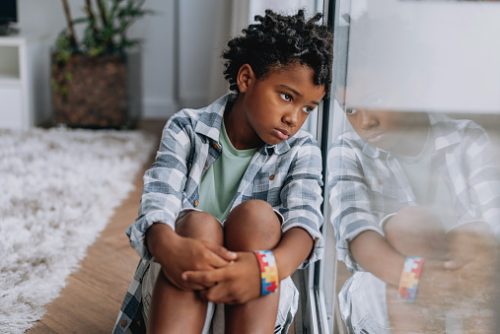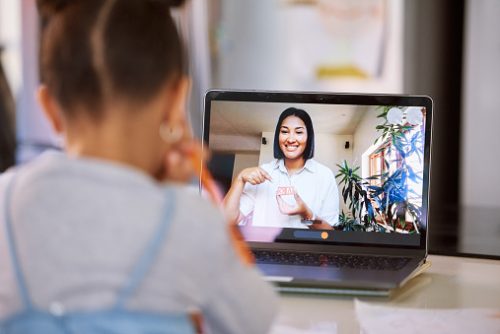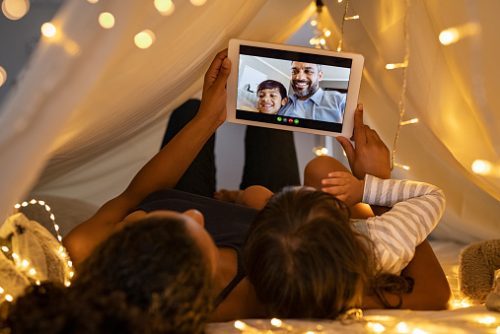
When Screens Replace Speech: A Pediatric Speech Therapist in NYC Weighs in on the Future of Children’s Communication Skills
A recent study that was published in the Journal of the American Medical Association (JAMA) this summer revealed an extremely concerning, downward trend in children’s health outcomes over the last decade.
This current study was conducted by the Children’s Hospital of Philadelphia and published in the JAMA Journal in the July 2025 issue.

This peer-reviewed research study examined the recent health trends in US children.
It revealed a downward trend occurring in the health and well-being of our nation’s children.
What the Latest Research Reveals About Children’s Health in the U.S.
These are the highlights of the July 2025 research study, which was conducted by Forrest, MD:
- Overall, a child in the US in 2023 was 15-20% more likely to have a chronic condition as compared to a child in 2011.” (Forrest, MD, July 2025)
- From 2007 to 2023, children’s health in the US has steadily declined across mortality, chronic physical, mental, neurodevelopmental conditions, functional status, and physical and emotional symptom domains.” (Forrest, MD, July 2025)
- The broad scope of this deterioration highlights the need to identify and address the root cause of this fundamental decline in the nation’s health.” (Forrest, MD, July 2025)
As a practicing speech-language pathologist treating children for over two decades, I have observed a dramatic shift in the use of screens over the last 10 years in all populations. This most certainly includes our children.
Many children are being exposed to screens before the age of one or two years old.
We should (of course) limit this exposure to screens for our young learners to a much later time in adolescence.
However, I do realize that some exposure to smartphones and screens is very hard to control in today’s highly connected world.
As a pediatric speech therapist in NYC, I am acutely aware of this reality. Given all the FaceTime, Zoom calls, and streaming options available at everyone’s fingertips these days!

Therefore, I am inviting us all to be mindful consumers of content and technology platforms we utilize every day. For the greatest good and benefit of ourselves, our children and our families, and the planet.
Balancing Technology and Communication: Guidance from a Pediatric Speech Therapist in NYC
I have personally and professionally witnessed changes in the trajectory of our children’s communication development, along with the increased usage of our screentime.
It is important to acknowledge both sides of the coin when discussing the topic of screen time and childhood speech and language development.
The benefits of the last two decades of technological advancements – including the inventions of smartphones, instant messaging, live video calls, social media, and the never-ending access to plentiful information on the internet – are undeniable.
The ubiquitous nature of all of these screening opportunities does have many benefits. For example, it results in:
- Increased connection to people around the world.
- Improved accessibility for all communication styles and preferences.
- Reduction of communication barriers.
- Increased possibilities for successful communication with non-verbal communicators.
It is crucial to also consider how increased screen time has presented some deleterious effects and unwanted consequences for our youth. This is particularly in the area of communication and cognitive development. For example, it has resulted in:
- Reduced attention and focus.
- Difficulty with memory and retention of information.
- Reduced social interactions and conversations with peers.
- Fewer verbal exchanges in the real world.
- Reduced critical thinking and problem-solving skills.
- Less flexibility of thinking.
- Reduced emotional regulation skills.
All these skills are extremely important to a child’s developing mind and social-emotional development.
Screen time is an important area of concern and focus for all parents, teachers, therapists, and caregivers right now. We all strive to foster a healthy mind, learning environment, social connections, resilience, and improved well-being for our families.

It is becoming more and more critical to consider your child’s use of screens, social media, and overall internet behaviors in order to safeguard their overall social-emotional health, well-being, and overall development.
Turning Screen Time Into a Learning Opportunity
Let me briefly share with you some easy and impactful ideas and ways to safeguard your child’s valuable time on screens.
Rest assured, there are ways to ensure that your child’s time online is beneficial, educational, and enhances their cognitive, communication, and social-emotional skills.
Here are some easy adaptations you can make to ensure a more positive learning experience while your child is online.
- Use FaceTime, Zoom, and Google Meet to catch up with friends, relatives, and teachers. These platforms use a synchronous communication modality. This creates a natural communication flow of real-time back-and-forth conversations between communication partners.
- Limit passive consumption of content. For example, sitting in front of the screen and binge-watching a certain show or movie for hours is not active learning. This type of media consumption is very passive and does not create new, neutral pathways for learning and development.
- Instead, be mindful about the content your child is consuming. Pick highly educational shows. Limit the watching time to only 15-30 minutes per day.
- Choose educational applications that encourage your child to engage in active learning activities instead.
I invite all parents, caregivers, teachers, and therapists to consider both the benefits and drawbacks of our increased screen time.
Additionally, I invite you to consider that now is the time to be extremely mindful about the screen time and overall content your child is consuming.

I invite you to gently take an audit of what your child is consuming online and perhaps think about how you can move towards more mindful online and offline activities with your family.
This may lead to improved joy and, dare I say, freedom – in your lives!
Offline Activities Recommended by a Speech Therapist in NYC
I’ll leave you some offline ideas to improve your child’s communication and socialization skills in the real world.
Here are some in-person activities to get your child communicating and socializing – just as the new school year approaches:
- Taking a walk in nature with friends.
- Playing the game ‘I spy’ around your neighborhood.
- Collecting rocks, sticks, and grass and making an end-of-summer collage.
- Playing hide and seek with friends outside.
- Playing a game of ‘red light, green light, 1,2,3.
- Bring a parachute or frisbee to the park.
- Make a lemonade stand.
As the end of the summer nears, I invite you to create an environment of balance, joy, and connection in your home by taking the time to talk, laugh, hug, and dance with your friends and loved ones – creating those treasured, simple moments of life!
Moving Forward with Hope, Connection, and Care
If your child is struggling in school and spending too much time online, we can help with speech therapy in NYC! Let us help you find what ignites their passion for learning.
Are you ready to experience the difference of bespoke, holistic, compassionate, personalized care at Chatty Child?
Chatty Child’s speech therapists can assess your child’s medical and education teams and craft an individually tailored treatment plan to address any areas of concern, while working seamlessly with your child’s medical team to achieve the best therapeutic outcomes for your child and family.
To book an in-person or online speech therapy assessment and treatment sessions with Heather Lynn Boerner, MA CCC/SLP, please visit our website at: www.chattychild.com; email: info@chattychild.com; or call: 347 491 4451
Sincerely,
Heather Lynn Boerner, MA CCC/SLP
Support Healthy Communication and Connection with Speech Therapy in NYC
Balancing the benefits of technology with real-world communication can be challenging for today’s families. At Chatty Child, our pediatric speech therapists in NYC help children build focus, language skills, and confidence, while guiding parents and caregivers toward mindful screen use and meaningful offline activities. Through individualized, evidence-based care, we empower children to thrive both online and in person.
Here’s how to take the next step with Chatty Child:
- Schedule a free 15-minute call to talk through your child’s needs and explore how speech therapy can support balanced screen time and stronger communication skills.
- Book a full evaluation to identify your child’s strengths, challenges, and areas for growth, laying the foundation for a customized therapy plan.
- Begin personalized therapy sessions that integrate speech strategies, mindful screen practices, and real-world play to support your child’s social, emotional, and communication development.
- Watch your child flourish as they gain confidence, improve attention, and strengthen connections with peers, family, and their community.
Helping Children Thrive: Comprehensive Care at Chatty Child
At Chatty Child, we recognize that raising children in today’s digital world comes with unique challenges. That’s why our services extend beyond speech therapy to address the whole child. They support communication, resilience, and healthy development, while giving parents and caregivers tools to balance screen time with real-world connections.
- InterAct – An engaging program that uses stories, role-play, and imagination to strengthen expressive language and build confidence.
- Occupational Therapy – Supports sensory processing, fine motor skills, and independence in everyday routines.
- Teletherapy – Flexible online speech and occupational therapy sessions for families across New York State, making care accessible wherever you are.
- Tutoring – Tailored academic support in literacy, writing, and problem-solving, designed to spark curiosity and success in the classroom.
- Functional Nutrition – Guidance that promotes emotional balance, focus, and physical well-being during key developmental years.
- Consulting – Coaching for caregivers, teachers, and professionals to create consistent strategies across home, school, and therapy settings.
- Group Programs – Interactive sessions that nurture social-emotional growth, peer communication, and learning through play and movement.
By blending creativity with evidence-based practice, our team helps children improve communication skills, strengthen emotional regulation, and thrive both online and offline.
About the Author: Pediatric Speech Therapist in NYC
Heather Lynn Boerner, MA CCC/SLP, is a New York State–licensed and nationally certified speech-language pathologist with more than 20 years of experience supporting children and families through pediatric speech therapy in NYC. Beyond her clinical expertise, Heather is also a certified mindfulness and meditation instructor, a trauma-informed practitioner, and someone who proudly identifies as neurodiverse and differently-abled. These lived and professional experiences shape the heart of her therapeutic style.
Her own path as a differently-abled individual inspired the creation of Chatty Child Speech, Occupational & Physical Therapy, PLLC—a welcoming and inclusive practice focused on helping kids thrive with personalized, compassionate care. Heather is also the author of Carrie the Colorful Chameleon, a children’s book that fosters confidence, learning, and friendship, complete with a teaching guide for parents and educators.
Today, Heather and the Chatty Child team provide both in-person services at their Tribeca, Manhattan clinic and virtual sessions across New York State, empowering children to grow in communication, confidence, and self-expression.
